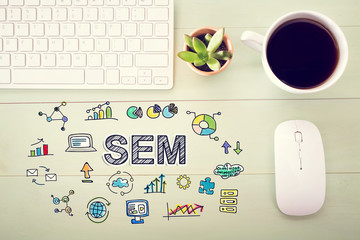An In-Depth Guide To Search Engine Marketing
Unlock the full potential of search engine marketing with our in-depth guide. Drive more traffic to your website and boost online visibility. Click now!

Introduction
If you are new to the world of search engine marketing (SEM), you may be wondering what the difference is between search engine optimization (SEO) and pay-per-click (PPC). Although both strategies can be effective, they are quite different.
In this blog post, we will go over the differences between SEO and PPC and help you decide which strategy is right for your business.
But what exactly is search engine marketing?
Search engine marketing is the process of optimizing a website to increase its visibility and ranking on search engine results pages. It includes both paid and organic search engine marketing techniques.
Paid search marketing, also known as pay-per-click advertising, involves bidding on keywords to appear as sponsored results on SERPs. Organic search engine marketing, on the other hand, is about optimizing the content of the website so that it appears higher on the SERPs for relevant search terms.
There are several different techniques that can be used in search engine marketing, including search engine optimization (SEO), and pay-per-click (PPC) advertising.
Maximize Your Online Presence with Our Digital Marketing Agency
-
SEO: Unlock more SEO traffic and see real results with our expert optimization services.
-
Content marketing: Attract and retain customers with high-quality, engaging content that drives traffic and generates leads.
-
Social media marketing: Our team creates epic content that will get shared, get links, and attract traffic on social media platforms.
-
Google Ads: Effective paid strategies with clear ROI. Let our team help you get the most out of your ad spend.
-
Email marketing: Connect with your audience and drive conversions with targeted email campaigns.
-
Web design and development: A visually appealing and user-friendly website is key to attracting and retaining visitors. Our team can help you create a website that converts.
Paid search engine marketing
Paid search engine marketing is an effective way to get your website to the top of the SERPs quickly. However, it can be quite expensive, especially if bidding on popular keywords. Moreover, paid search engine marketing is a short-term solution - once you stop paying for ads, your website will no longer appear as a sponsored result.
Organic search marketing
Organic search marketing is a more sustainable solution, as it relies on optimizing your website to appear higher in the SERPs for relevant search terms. This can take some time but is a more cost-effective solution in the long run.
Besides, organic search engine marketing helps you build a more reputable and trustworthy website, as users are more likely to click on results that appear higher in the SERPs.
Why search engine marketing?
Search engine marketing is essential for all business sizes.
As a business owner, you may be wondering if search engine marketing (SEM) is worth your time and money. The answer is a resounding yes! SEM is vital for small businesses because it helps you reach your target audience and promote your products or services.
If you do not use any of the strategies, your website may never be seen by potential customers. And even if they do find your website, they may not know what your business offers. Search engine marketing helps you change all that by driving targeted traffic to your website and increasing your visibility in search engines.
Search engine optimization (SEO) vs. pay-per-click (PPC). Which option should you choose?
Struggling with the decision of whether to focus your marketing efforts on SEO or PPC? Well, you are not alone. Many businesses are stuck in this quandary, but luckily, we are here to help.
To help you decide, let us take a look at the key differences between SEO and PPC. First of all, SEO is about optimizing your website and content to rank higher in search engine results organically, while PPC is about paying for ads displayed to users who search for keywords related to your business.
Read: The Basics Of Search Engine Marketing (SEM)
The pros and cons of organic search marketing and paid search marketing
Organic search marketing (SEO)
Everything has its pros and cons - including search engine optimization (SEO). On the one hand, SEO can be a great way to help your website rank better in search engines and get more visitors. On the other hand, it can also mean a lot of work with no guarantee of success.
Let us take a look at more pros and cons of SEO so you can decide if it's right for you.
Advantages of SEO
-
It helps improve your website's search engine ranking.
-
It helps you save money on paid advertising.
-
It helps you dominate your niche. This gives you a good reputation, which in turn leads to more traffic to your website.
-
It can help you get more visitors for certain keywords.
-
SEO can help you build brand awareness and credibility.
-
SEO can help make your website more user-friendly, which can lead to a better user experience and lower bounce rates.
Disadvantages of SEO
It's undeniable that SEO can be a powerful tool for businesses. But SEO is not all sunshine and rainbows. There are also some disadvantages of SEO that you should know about.
Here are a few of them:
-
SEO is constantly changing - What works today may not work tomorrow. So you always need to be on your toes and adjust your strategies as needed.
-
SEO can be time-consuming - Optimizing your website and content for SEO can take a lot of effort and patience.
-
SEO can be expensive - If you do not do it yourself, you'll need to hire an SEO expert or agency, which can cost money.
-
SEO can be a challenge - If you do not know how SEO works, it can be difficult to measure results. You need to know exactly how SEO works to be successful.
-
SEO can be risky - if you are not careful, you can accidentally damage your website's ranking or even get penalized by Google.
Read: What is the Role of SEO in Digital Marketing?
Paid Search Engine Marketing (Pay Per Click)
In the world of online advertising, there are many decisions to make. One of the most important decisions is whether or not to use pay-per-click (PPC) advertising.
Pay Per Click is a great way to drive traffic to your website and can be an extremely effective way to generate leads and sales, a great way to reach new customers and grow your business. But it can also be a big waste of money if you do not know what you are doing.
Advantages of paid advertising
-
It can help you increase your brand awareness and bring your product or services to the forefront.
-
You only pay when someone clicks on your ad.
-
It's a great way to get your website in front of people who are already searching for what you have to offer.
-
And since you only pay when someone clicks on your ad, it can be a very cost-effective way to market your business.
-
It can be a great way to test new products or services. You can create a small ad campaign and see how it performs before investing a lot of money in a larger campaign.
-
You can use it to reach people at different stages of the buying cycle.
-
It is highly targeted, which means you can reach potential customers who are already interested in your offer.
-
PPC advertising is flexible, which means you can adjust your budget and bids at any time.
Disadvantages of paid advertising
There are a lot of things to love about pay-per-click advertising. What's wrong with getting instant traffic to your website without having to wait for your SEO efforts to take hold? And what's not great about being able to track your results and see exactly what's working and what's not?
However, there are also some downsides to pay-per-click advertising that you should know about before you get involved.
Here are a few of the most important ones:
-
PPC can be expensive - If you are not careful, you can easily spend a lot more money on PPC than you take in sales. You can quickly accumulate a large bill with nothing to show for it.
-
PPC can be time-consuming - If you want to be successful with PPC, you have to be willing to invest a lot of time in managing your campaigns.
-
PPC takes time to set up - You can not just start a campaign and wait. You need to monitor and optimize campaigns to make sure your ads are performing well and that you are not overspending.
-
PPC ads can be intrusive and disruptive, which can hurt your business.
-
PPC can be risky - If you are not careful, you could end up paying for clicks that never lead to sales.
Why you need both paid and organic search marketing
In the world of digital marketing, there's a lot of debate about which is better - SEO or PPC. And while both have pros and cons, we think the answer is clear: you need both!
Here is why:
Search engine optimization is great for building organic traffic over the long term. But it can take months or even years before you see results.
Pay-Per-Click, on the other hand, can get you instant traffic, but it can be expensive, and if you do not know what you are doing, you could end up wasting a lot of money, and when you stop paying for it, your traffic disappears too.
So if you want to see results quickly and build a sustainable traffic stream, you need to use both SEO and PPC. They complement each other perfectly and will help you achieve your digital marketing goals.
Are you ready to dominate the SERPs with SEO and PPC? If you answered yes, then congratulations!
Conclusion
In summary, search engine marketing is a complex and multi-layered process. It requires a deep understanding of how search engines work, as well as a strong ability to develop and implement effective strategies.
If you need help with your Google Ads or SEO, contact Tabala Digital Solutions. We are the best digital marketing agency in Nairobi and we can take your business to new heights.

Strategist Profile
Abala Tom
Digital systems strategist specializing in high-performance SEO, Google Ads, and conversion optimization. Mission: to replace marketing 'guesswork' with predictable revenue systems.